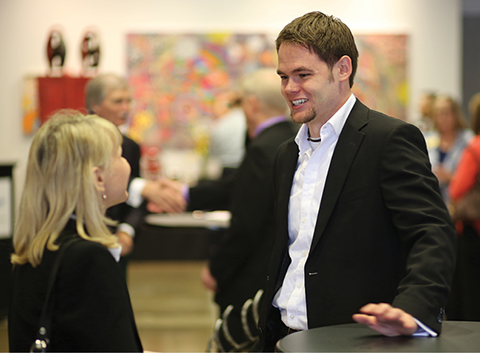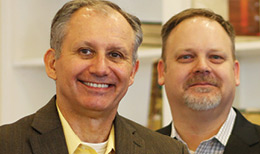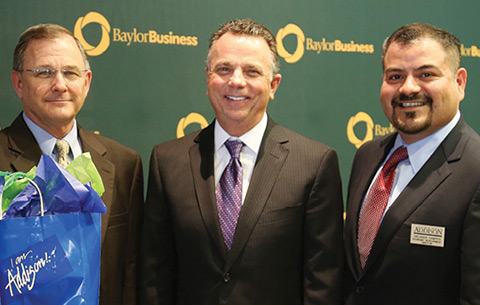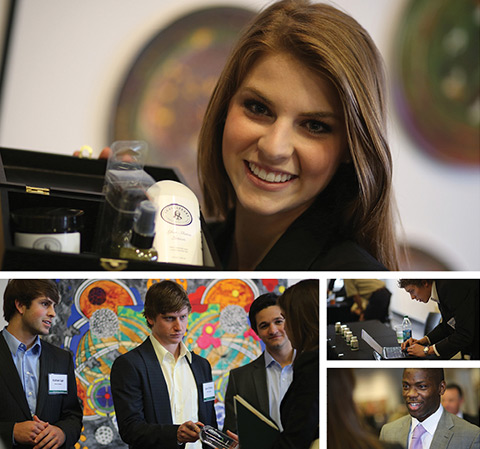Business Education Innovation
Just 14 years ago this spring, Denver Fredenburg, BBA '99, was a captain on the Baylor baseball team and a soon-to-be Baylor graduate with a degree in business administration. Today, Fredenburg is the successful chief executive officer of Hyperwear, Inc., an Austin-based multimillion-dollar fitness gear startup that is thriving despite the volatile economy. It's not surprising that Fredenburg largely attributes his business success to his exceptional academic experiences and the strong personal relationships that he developed at Baylor. But what is surprising is that when Fredenburg visits campus to present his business insights to today's students in the classroom, he's not just proud - he's envious.
Leveraging engaged learning
"When I present in the classroom [to students in the Baylor entrepreneurship program] and pitch on campus [to the Baylor Angel Network, a network that connects investors to entrepreneurs], I am so envious of the opportunities that these young groups of students get," says Fredenburg. "The new entrepreneurship programs, the access to small business and the chance to present to investors is invaluable. Baylor students have more experience interfacing with executives of successful companies, developing business plans and pitching to early-stage investors. To have this knowledge base and expertise at the front end, right out of the gate, is unique.
"The talent that I see coming out of the business school today is amazing," adds Fredenburg. "These students are so motivated to become entrepreneurs, and they're entering the marketplace with a head start in their field."
Fredenburg is not the only one, of course, who's noticing the unique opportunities available to the nearly 3,000 undergraduate and graduate students in Baylor's business school. In fact, in a survey of more than 2,000 colleges and universities conducted by The Princeton Review last year, the entrepreneurship program in Baylor's Hankamer School of Business came in No. 2 in the country (the program's fourth straight year in the top five) and No. 1 in Texas.
"One thing that characterizes the best business education today is engaged, active learning that combines classroom instruction with hands-on experience in real projects, companies and interactions with business professionals in the marketplace," says Dr. Terry Maness, BA '71, MS '72, dean of the Hankamer School of Business. "With engaged education, students are leveraging what they're learning in the classroom and applying it in the real world before they even graduate. The nature of this approach to education also provides a 'flipped' learning experience in which students bring what they're learning in the real world back into the classroom."
While engaged learning, including entrepreneurship programs, is quickly becoming the benchmark for successful business education today, the idea is not new at Baylor, says Maness.
"Baylor's rich history and tradition of entrepreneurship dates back to the late '70s with courses and programs that have become part of the fabric of the business school," he points out. "Baylor is a private university; we can't depend on state funding. We have to be innovative to attract the best students and acquire funding. That begins with faculty who've been involved in research scholarship and entrepreneurial ventures and can bring their experience to the classroom, teaching with a 'been there, done that' approach. They also understand the entrepreneurial process and mindset and are entrepreneurial in creating new programs."
Pioneering a program
Among the most innovative -- and popular -- of those new programs is the Accelerated Ventures Program (AVP), a two-semester course in which four teams of three students each (all juniors and seniors) launch startup companies that sell a product or service. The companies are expected to be up and running within the first 45 days of the start of class, generate income by the end of the first semester, and show a profit by the end of the second semester. Each team starts with $5,000 of seed money from the Baylor Angel Network, whose investors take a 10 percent stake in each company (the student owners retain the remaining 90 percent).
The program, started in fall 2011, is the brainchild of Baylor alumnus David Grubbs, BBA '07, a "serial entrepreneur" and part-time lecturer; Dr. Kendall Artz, chair of the Department of Management and Entrepreneurship; and Dr. Les Palich, the W.A. Mays Professor of Entrepreneurship.
"The Baylor Angel Network is providing $5,000 of startup capital with no strings attached and the ecosystem for these companies to grow, including access to an all-star advisory panel," says Artz. "This program is a truly unique educational program."
Students are also encouraged to dream big with ideas for startups that go beyond the ubiquitous T-shirt shop.
"We want students to launch high-potential ventures, not low-yield businesses," adds Artz. "We limit the type of business that they can launch to those startups with the potential of generating seven figures of revenue in a short period of time. We're setting the bar high."
As a founder and partner of more than a half-dozen companies, Grubbs knows what it takes to be a successful young entrepreneur today.
"Baylor's business school provided the foundation and support that I needed to launch my first business in 2005, which has developed over the years into a rapidly growing e-commerce platform, vendevor.com," says Grubbs, who teaches and advises students in the AVP. "I applied lessons that I learned in finance, accounting, negotiations and a number of other classes directly and immediately into my business. That knowledge paired with amazing mentors ... really helped me avoid pitfalls and stay on the right path to creating a successful company."
Still, as a working entrepreneur for the past five years, Grubbs is committed to further enriching opportunities for engaged, real-world learning.
"Our goal is to change the way entrepreneurship education is taught in school," says Grubbs. "Entrepreneurs are artists who need to practice their art. If you had a virtuoso like Picasso, you'd give him a paint brush, or a Vivaldi, you'd give him a violin; you wouldn't just provide theory and history. Well, the same applies to entrepreneurs; they need experiential learning."
While AVP students come from different majors and schools within the university, one thing that all students have in common is entrepreneurial drive, says Grubbs. "They are essentially creating their own jobs."
Grubbs and Artz hope to share the program's learning model with other universities and institutions in the U.S. and abroad.
"Only a small handful of other universities provide the breadth of offerings that Baylor does. We offer dozens of courses with experiential activities and can accommodate students interested in everything from technology entrepreneurship to family businesses to social entrepreneurship," Artz explains. "Baylor also offers depth with resources and expertise in many areas, including international opportunities in places such as Africa, Europe, Latin America and China. There's so much change and so many resources being devoted to entrepreneurship that we're able to have great impact on the economy. We're focusing on expanding our reach to students outside Texas and even to other countries to learn about entrepreneurship, forming partnerships with other academic and nonacademic organizations."
Incubating innovation
Plans are already in motion for trailblazing partnerships in Waco and North Texas. In March, the Greater Waco Chamber and Baylor launched "Thinc Space," a business incubator for creative start-ups that will house the AVP. Students enrolled in the program will receive free office space downtown for up to two years as they build their businesses; they will also have access to mentoring, support and professional expertise from a network of local business owners.
After graduation, select student teams will take the companies that they've created in the Accelerated Ventures Program and launch them in Addison, Texas, where they'll receive one year of free office space and ancillary services (including administrative, accounting and legal support). The start-up will also receive free membership in the chamber of commerce and business connections that will help their businesses survive -- and thrive -- to impact the local economy.
Given the fact that about 80 percent of businesses fail within five years of launch, these are substantial opportunities for young entrepreneurs.
"The idea [for the Baylor-Addison partnership] surfaced as we were contemplating how to expand our support for entrepreneurship in the town," says Orlando Campos, director of economic development for the Town of Addison, who was introduced to Grubbs, who is also an Addison resident. "When I met with [Grubbs], I realized the tremendous opportunity the Accelerated Ventures Program presented. It ran in line with our Town Council's goal to be innovative, attract new businesses to the community and to grow our own businesses. The program was very much supported by the Baylor business school and the Baylor Angel Network, so we knew that the businesses involved in the program had already gone through a vetting process and the companies in the program had been identified for their strong viable business sense."
Campos also recognized that these Baylor startups have the potential to become paying tenants in Addison's office buildings in their second year, as well as having the potential to grow into larger employers.
"I saw this [initiative] as a minimal investment in what could generate tremendous returns on investment for the community's long-term economic development endeavors," says Campos. "I also knew that Addison has long been a haven for entrepreneurial startups and has in place a strong entrepreneurial ecosystem that could support the growth of these companies."
Among those Baylor students who will relocate to Addison upon graduation this May is Allison Kusenberger, a senior entrepreneurship and marketing major from Little Rock, Ark., who, along with her two AVP student partners, launched Shavespeare, a company that sells an upscale facial shaving kit for men.
"Being part of the Accelerated Ventures Program has opened up a lot of doors and valuable resources to me; I have access to so much knowledge," says Kusenberger. "The professors give you so much help along the way, but you have to ask for the resources and take the opportunity to pick their brains. You also have to have the motivation to do the work on your own. You're never really 'done' when you're building a business."
Thanks to the AVP, Kusenberger has experience pitching to investors in the Baylor Angel Network, building a business website and making key connections with business leaders.
"I wouldn't be able to start a business right out of college without this experience," she adds. "I have the confidence now and the ability to start a business. There's a big difference between reading about business in a textbook and actually building a business. If it weren't for Baylor, I wouldn't get this kind of education."
Also heading to Addison this spring is Sam O'Brien, a senior public relations and journalism major from Austin. O'Brien and his two AVP partners started the company Whol-E Water, which sells bottled alkaline water with a healthfully high pH range. Whol-E Water is currently available in health stores and coffee shops in Austin, but O'Brien and his partners are seeking a distributor to help them put their product in at least 50 stores throughout Texas by year's end. Sold out of their first production run, a portion of their sales on the second run will go to helping impoverished communities abroad build wells for clean water.
"Accelerated Ventures is the most beneficial course I've ever taken for the applied learning, angel funding and business connections," says O'Brien. "[My team and I] were able to pitch to the Baylor Angel Network in two rounds of presentations. About 30 angels were in the audience giving us critiques on the spot. And now, when I need advice, I know that they're just a phone call away."
Calling an Angel
The ability to tap into the Baylor Angel Network (BAN) as a student and continue to have access to the network after graduation is a significant opportunity, says BAN Executive Director Kevin Castello, MBA '09. While the network (founded by Baylor alum Bob Brewton, BBA '74) is only in its fourth year of existence, members are composed of highly respected, top-level business innovators who want to work with Baylor students by investing their money in entrepreneurial ventures or their time serving as mentors -- or, more often, both. Angels must meet certain criteria to join the group, including an annual income of at least $200,000 for the previous two years or a $1 million net worth.
But what sets Baylor's angel network even further apart from so many other networks in the country is that all investors must give a portion of their profits -- however much they wish -- back to the university.
"The Baylor Angel Network is the only integrated network in the country," adds Castello. "Baylor's investors want to give back to the university, which is part of the endowment building process."
Investors also want to give flight to inventive ideas that galvanize economic growth in the Greater Waco region and beyond.
"Entrepreneurship in small companies is what drives economic growth," says Castello. "Innovation often comes out of small companies, and great ideas need funding, or they'll die before they ever get started. As Baylor's entrepreneurship programs develop over time, we'll be able to help more and more people. I'm proud that Baylor is providing part of that ecosystem."
But BAN is not only an investor organization; it's also a two-semester Venture Associates Practicum for senior-level undergraduate students interested in entrepreneurial finance. Each semester, 12 students -- six senior analysts and six junior analysts -- serve in the coveted roles of student analyst interns for a venture fund with responsibilities that range from clarifying working business issues to evaluating real investment opportunities.
"This is a hybrid program; half of it focuses on theory, and the other half involves the operations of the Baylor Angel Network. Students participate in the screening process [for companies pitching for funding], giving them a unique understanding of early-equity investment," explains Castello. "As a result, they are learning the industry before they're financially qualified to enter it."
Not surprisingly, there are more candidates than spots open for the practicum, and the selection process is highly competitive. Just to be eligible to apply, you must be a business major with at least a 3.5 grade point average. Senior student analysts manage the application process, screening resumes, interviewing candidates and reviewing applicants' case analyses to award the six junior analysts positions.
Cody Orr, a finance major from Sugar Land, Texas, is currently a Baylor Angel Network senior analyst who already has an excellent job in strategy and operations at Deloitte lined up upon graduation this May -- thanks in no small part, he says, to the experience he's gained and relationships he's developed in this program and other active learning courses in the business school.
"I chose to attend Baylor because I knew that I'd get a unique college experience where I could get 'plugged in' -- not just sit in a classroom with 30 other students listening to lectures," says Orr, who was "blown away" by an entrepreneurship finance class that he took, prompting him to add entrepreneurship to his major as a second-semester junior. "Being a student analyst in the Baylor Angel Network provides me with valuable experience from finance experts. Through this amazing opportunity, I learned how to fulfill the role of an analyst right out of college.
"I also know exactly what I would need to do to raise capital if I were to become an entrepreneur down the road," says Orr, recalling one priceless experience in which he learned how to "think like an investor" from a BAN member's two-minute bullet-point-style critique of a startup pitching for funding.
Orr regularly attends BAN's pitch sessions, observing entrepreneurs -- including the AVP students -- present their ideas and watching investors critique and evaluate companies.
"The Baylor Angels are investing in companies as well as in our education. They're open to talk and give advice about job opportunities," says Orr, adding that this highly engaged learning culture gives students a unique edge in the business world. "Baylor gives you the technical tool set and the opportunities to use those tools to succeed in today's business world."
When Fredenburg makes presentations on campus about the world of entrepreneurship, he's often asked for career advice from budding Baylor entrepreneurs, to whom he replies: Go to work for a startup company.
"Choosing to work for a startup rather than a big corporation, you're going to leave some money on the table, but you'll have access to so many different departments and wear multiple hats, gaining great experience," he says. "I often tell Baylor students, 'if you come work for me [at Hyperwear], I promise to pay you less and work you more."
And that's just the kind of priceless opportunity that would make most any burgeoning entrepreneur ... well, envious.




